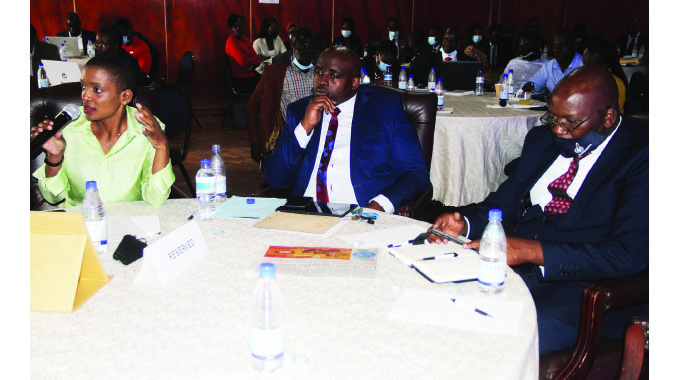Private sector-led approach key in climate change adaptation

Elita Chikwati Senior Agriculture Reporter
The private sector-led approach in dealing with climate change and adaptation has been viewed by the Government as key in reducing negative effects of the phenomena.
This came out yesterday at the Zimbabwe: Financing Climate Change Adaptation-Investment Conference organised by Zimpapers in conjunction with the Institute of Chartered Accountants of Zimbabwe and Financial Markets Indaba.
The conference highlighted on issues that include accelerating the energy transition – policies to deliver a rapid and efficient de-carbonisation of the energy sector addressing energy challenges, manufacturing, importing and use of energy efficiently.
Also on discussion the role of institutional finance for the agricultural sector in promoting growth, ensuring better equity and making financial operations viable and connecting farmers to technologies.
Officiating at the conference, Environment, Climate, Tourism and Hospitality Industry Minister Mangaliso Ndlovu said the private sector-led approach was a more sustainable approach as the Government worked towards developing and promoting a conducive and enabling policy environment for business in the climate agenda.
“I express my appreciation to the private sector for joining hands with Government towards framing and stimulating the climate financing agenda.
“Zimbabwe will need investments towards low emissions and climate resilient development pathways. As a country largely dependent on natural resources, we require to trigger a development approach that is pro-green, sustainable and climate resilient,” he said.
He said Zimbabwe was vulnerable to changes in the climate system and the situation was made worse by limited climate knowledge among citizens and over-reliance on climate sensitive sectors for survival such as energy, agriculture, forestry, and water resources.
“Cyclone Idai in 2019, the current mid-season dry spell, recurring problems of pests and diseases, not least the ravages of COVID-19 demonstrates that we face an unprecedented climate crisis.
“The change in climate will further threaten already strained water supplies, food and nutrition security, health, hydro-electric power generation, human settlements, infrastructure, and biodiversity amongst other key areas of human development thereby impeding the country’s social and economic development aspirations.
“Zimbabwe’s socio-economic development is dependent on rainfall; over the last 10 years, we have had 4-5 seasons of drought and our economic performance is strongly positively co-related with rainfall.
“This rainfall season has been characterised by poor spatial and temporal distribution of the rains.
“Prolonged dry spells inter-spaced with heavy rains caused flash flooding in some areas, directly threatening our food security and economic performance,” he said.
Minister Ndlovu said Government had acquired five radars to improve on early warning systems, weather and climate monitoring and weather-related information for decision making by policy makers, farmers, industry and other stakeholders building towards data driven climate resilience.
“Our Vision (2030) and National Development Strategy (NDS1) (2021-2025) dictates that climate action is a national priority. We have identified national priorities for the next four years are renewable energy and energy efficiency, climate smart agriculture for food security and sustainable agriculture.
“It is critical that we upscale investments in rainwater harvesting, supplementary irrigation adoption of drought tolerant crop varieties and adoption of viable business models to sustain agricultural production through value addition, market development and consolidation,” he said.
Agricultural Rural Development Authority chief executive, Mr Tinotenda Mhiko said Government was promoting smart agriculture including Pfumvudza so that smallholder farmers could still get high yields even under dry conditions.
“Climate-proofing the country’s agricultural sector, Government is promoting irrigation schemes to befit local people, improve household food security and incomes.
He said the irrigation projects will run as business units under the management of resident Arda scheme business managers while farmers will be trained in farm management practices.
African Risk Capacity director, Mr Lesley Ndlovu said there was need of input from all players in the agricultural value chain to finance climate adaptation.
“Government, insurance sector and banks should play a role. The private sector has a role to play because we cannot sorely depend on Government to tackle all the issues,” he said.








Comments